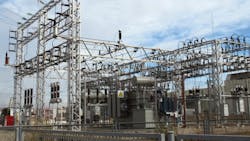Snohomish PUD Takes New Approach to Energy Storage
Snohomish County PUD has announced its new energy storage project, the first-ever built using the innovative Modular Energy Storage Architecture (MESA). The PUD’s MESA project, located at a substation in Everett, Washington, is designed to improve reliability and the integration of renewable energy sources.
The project was made possible in part by a $7.3 million investment from the Washington Clean Energy Fund. The PUD system, the first of several MESA energy storage projects the PUD is pursuing this year, positions the state as a smart grid technology leader and creates cost effective solutions to better utilize renewable energy.
“Washington utilities are some of the most innovative in the world, and I applaud Snohomish PUD and its partners for making this commitment to cutting-edge technology that will help us lead the world’s clean energy economy – other states are watching your work!” said Gov. Jay Inslee. “It’s exciting to see investments from the state’s Clean Energy Fund advancing our goals to save energy and cut costs for Washington companies and consumers, reduce harmful emissions, and support jobs throughout the state.”
“The electrical grid needs to change to take on more renewable power, and standards-based storage and software will play major roles in that change,” PUD General Manager Steve Klein said. “MESA provides standard interfaces to bring more choices for utilities, reduces projects’ complexity and promises to lower costs.”
1Energy Systems, the principal PUD partner, is the architect of the MESA software controls.
To support the Snohomish PUD project and the other Clean Energy Fund projects, the U.S. Department of Energy’s Pacific Northwest National Laboratory (PNNL) is working with participants to develop use cases, or detailed descriptions of the many ways energy storage can increase renewable energy use and improve grid efficiency and resiliency. The PUD and the other utilities will consult these use cases as they implement and evaluate their projects. PNNL is also providing analytical and technical support, including conducting benefits analysis, designing test plans, and enhancing control strategies.
The MESA system provides a standard, non-proprietary and scalable approach to energy storage. The PUD’s energy storage program, which forges partnerships with major U.S. and international business partners, will include two large-scale lithium ion batteries, one built by Mitsubishi and GS Yuasa and a second by LG Chem. Both lithium ion batteries will utilize a Parker Hannifin Power Conversion System. Later this year, the PUD will deploy multiple advanced vanadium flow batteries at a second PUD substation, which will be built by UniEnergy Technologies, based in Mukilteo, Wash.
"This project demonstrates how MESA technology standards, pioneered in Washington, will accelerate global innovation in energy storage,” said Darcy Wheeles, Program Director of the MESA Standards Alliance. “Standards-based products make it easier and less expensive for utilities to control and optimize energy storage and integrate renewable power sources with the grid.”
The collaboration will produce state-of-the-art solutions, bringing together major equipment and software companies to establish the appropriate industry standards and interfaces. The open standards approach is much different than other energy storage projects in the past and is expected to result in the expanded application of plug-and-play type energy storage systems to help solve the expanding needs of today’s electric grid, which depends more on intermittent resources such as wind and solar.
MESA Project Goals
Key goals of the MESA project include:
- Developing standard electrical and communication interfaces to connect batteries, power converters and software components into modular energy storage systems
- Helping to foster a robust industry ecosystem of modular energy storage component suppliers. By sharing their learning with other electric utilities and technology suppliers, MESA Project partners are advancing a new, component-based approach to energy storage that gives electric utilities more choice, and enables battery, power converter and software manufacturers to reach more customers while focusing on their core competencies.
- For more information on the MESA Alliance, see www.mesastandards.org
Project Partners
- 1Energy Systems, principal partner and architect of MESA software controls
- Alstom Grid, supplier of the PUD’s EMS, SCADA & DMS platforms
- LG Chem, supplier of lithium ion battery
- Mitsubishi-GS Yuasa, supplier of lithium ion battery
- UniEnergy Technologies, supplier of vanadium flow battery
- Parker Hannifin, provider of the MESA-compliant power conversion system
- University of Washington, research expertise in power systems and computer science
- Pacific Northwest National Laboratory, research expertise in power systems
